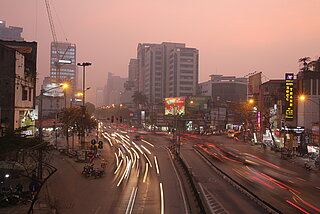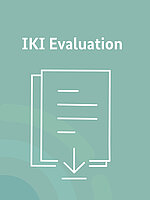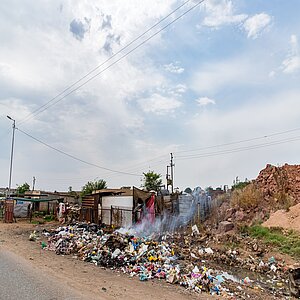International Day of Clean Air for blue skies

92 per cent of the world’s population is not breathing clean air. The first International Day of Clean Air for blue skies is drawing attention to this global problem, with German support.
According to the World Health Organization (WHO), around seven million people die every year from polluted air. Acute and chronic diseases caused or aggravated by air pollutants include respiratory diseases such as asthma and lung cancer, as well as cardio-vascular illnesses like strokes and heart attacks. Congenital disabilities, miscarriages and premature births are also associated with air pollution, as are many neurological diseases, including migraine, Parkinson’s and dementia and psychological illnesses such as depression. Recent studies have also shown that the susceptibility of the human body to viral diseases such as the coronavirus is increasing in people who have previously been exposed to polluted air for long periods.
Air pollution particularly affects disadvantaged population groups in Asian, African and Latin American developing countries. The economic costs caused by this environmental problem are enormous – and they are also rising. For example, the World Bank calculated that global welfare losses caused by air pollution amounted to 5.1 trillion US dollars in 2013.
Air pollution is not only harmful to human health
Air pollution not only harms human health, it also has a negative impact on ecosystems. Ground-level ozone damages plant growth and results in considerable harvest losses for wheat and beans (including soya beans), as well as various varieties of rice and corn. Air pollution thus jeopardises food security in several global regions. Forests and grasslands are globally regarded as important CO2 sinks. Through these plant growth losses, ground-level ozone results in a reduction in the CO2 storage capacity of vegetation, which leads to an additional warming of the atmosphere. Ozone also endangers biodiversity, since ozone-sensitive plants can no longer survive in ecosystems when their vitality has been weakened by its effects, thus contributing to a decline in biodiversity.
Air pollution also exacerbates climate change. Many air pollutants are also greenhouse gases, which contribute to global warming. They belong to the short-lived, climate pollutants (SLCPs), such as methane, soot and ground-level ozone. Air pollutants and greenhouse gases often originate from the same emission sources.
Fewer air pollutants also mean fewer greenhouse gases
A reduction in air pollutants is therefore associated with a reduction in greenhouse gases – and this can constitute a major step towards meeting the nationally determined contributions (NDCs) of the Paris Agreement. Integrating a reduction in SLCPs into the NDCs offers an excellent opportunity to integrate the many deadweight effects of air pollution control – the protection of human health, of the biosphere, of agricultural yields, etc. – into our own climate change mitigation goals.
Against this background, the United Nations General Assembly has proclaimed the seventh of September as the International Day of Clean Air for blue skies, which will take place for the first time in 2020. In the future, this day is intended to provide a platform for international exchange on air pollution, to compare best-practice approaches and to promote known solutions in air pollution control.
The Federal German Ministry for the Environment, Nature Conservation and Nuclear Safety (BMU) is directly involved in the organisation and financing of the first International Day of Clean Air for blue skies through the Deutsche Gesellschaft für Internationale Zusammenarbeit (GIZ). Through GIZ, BMU supports the United Nations Environment Programme (UNEP) in implementing the International Day. Its partners include the South Korean government, the World Health Organization (WHO), the Climate and Clean Air Coalition (CCAC) and other international stakeholders.
Events are planned to take place in Seoul, Bangkok, Bonn and New York on the first International Day of Clean Air for blue skies. Most – but not all – of these events will be streamed virtually due to the coronavirus. The events range from international discussion forums involving high-ranking politicians and diplomats such as Ban Ki-Moon, to social media campaigns (both national and global). The day is also being intensively promoted in South Africa and Vietnam, the partner countries of the IKI project, “Integrated Air Quality Management (AQM) and Climate Change Mitigation in the framework of the World Bank’s Pollution Management and Environmental Health (PMEH) Programme”.
The link has been copied to the clipboard
Contact
IKI Office
Zukunft – Umwelt – Gesellschaft (ZUG) gGmbH
Stresemannstraße 69-71
10963 Berlin
"It is a global task to ensure cleaner air"
Photo: BMU/photothek/Thomas Trutschel






